🇬🇧
Concert organised by the 2Act Foundation in collaboration with Villa Decius.
Translation into Polish by Bartosz Sowiński.
Photos by Adelina Krupski Photography for Kraków Music.
🇵🇱
Koncert zorganizowany przez Fundację 2Act we współpracy z Willą Decjusza.
Tłumaczenie na język polski Bartosza Sowińskiego.
Zdjęcia Adeliny Krupski Photography dla Kraków Music.
A dark midwinter’s evening is the setting for a slice of summer sunshine
Resplendent and grand, nestled at the foot of the primeval expanse of Wolski Forest, Villa Decius was the setting for an intimate concert by Ablaye Badji on the kora (Senegal) – a multi-stringed harp from West Africa – and Ethan Smith on bass, alto sax and piano (South Africa). The villa has morphed and been adapted down through the centuries – from its inception in the 16th century as a rural manor house, to a military barracks during the war, a training centre, boarding school and even a tuberculosis ward. During that time, it has withstood the ravages of calamity, terror, fire, disrepair and neglect; today fully restored, it survives as a cultural beacon of the city and the seat of the Villa Decius Association. Tonight, it’s a concert venue and an occasion that would delight and entertain all fortunate enough to be present, as we were regaled by two sons of Africa, far away from the lands of their birth.
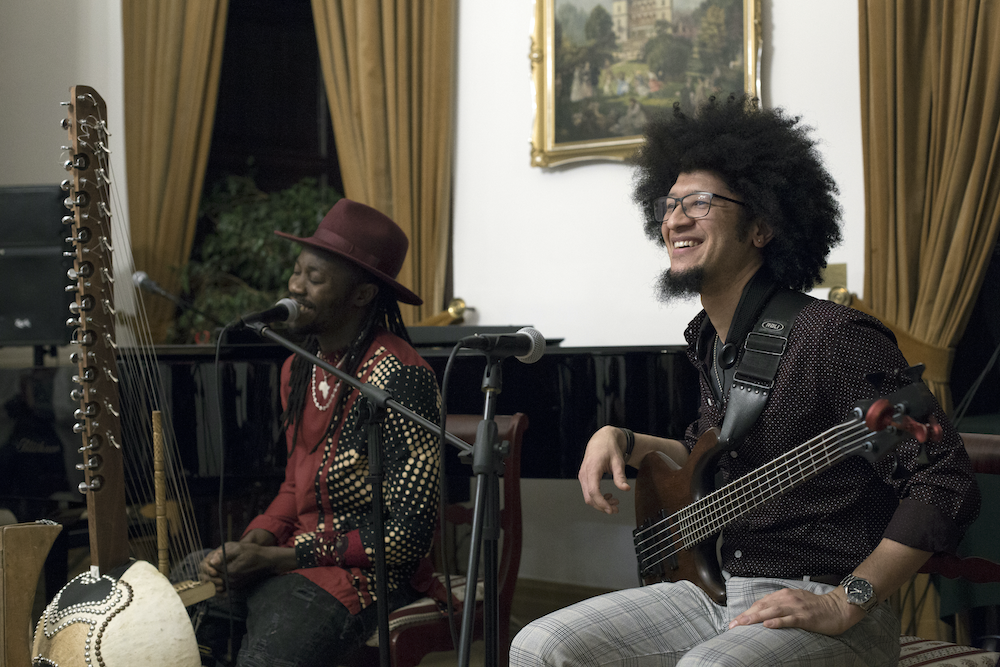
I’ve seen the Senegalese musician perform several times over the last few years, but I feel his recent playing of this sublime and magical instrument has reached a new zenith – his finger-picking is fluid and flawless, there is passion and power, restraint and rawness.
— Shaun O’Neill
Ablaye opened the evening with Keita, a song as delicate as a spring flower, exciting like the touch of a long-absent lover’s kiss. The tender, gentle strokes of his kora are mesmerising as is the look of intensity and joy radiating from his face during the performance. I’ve seen the Senegalese musician perform several times over the last few years, but I feel his recent playing of this sublime and magical instrument has reached a new zenith – his finger-picking is fluid and flawless, there is passion and power, restraint and rawness. There is so much lineage and love bursting forth from the man’s playing, His hallowed griot ancestry lines, like rivers that carve deep canyons in the side of ageless mountains, can be traced back through the centuries in his homeland. His ancestors played for royalty. You can see why. His kora is as complex and brimming with melody and rhythmic invention as any classical baroque harpsichord performance. Smith’s bass is the solid low-end that grounds many of the tunes here with a confident yet understated contribution. In second number, Kuma, he is the foundation that allows the myriad shades of expression of the kora to fully and unselfconsciously take flight. Badi Ya has a carefree and youthful heart, and Ablaye encourages us to engage, move, interact, “dancing is for free” he teases. Some people take him up on the offer, masked audience members shaking their hips and swaggering to the music’s soft lilt is a bizarre but much needed injection of normality in our times; the heart-felt clapping and giddy interaction of the audience with the musicians, in a setting that might be regarded as a bit stiff and somewhat intimidating, proves how much we need joy, humour, contact with other each – how much we need music.
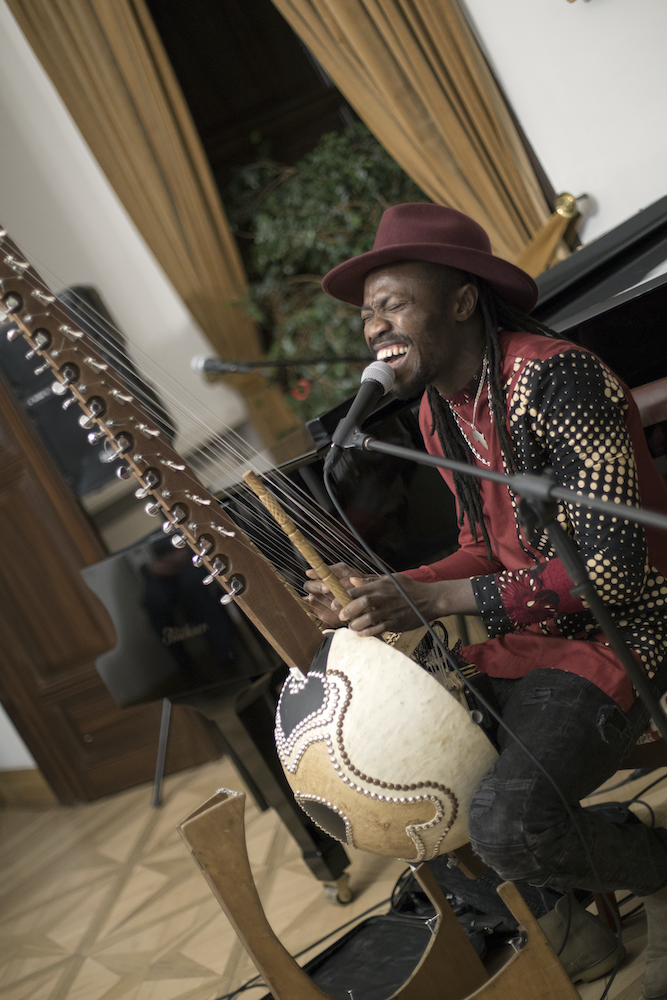
- Keita – Ablaye Badji – live rec. 12.12.2021
5:56
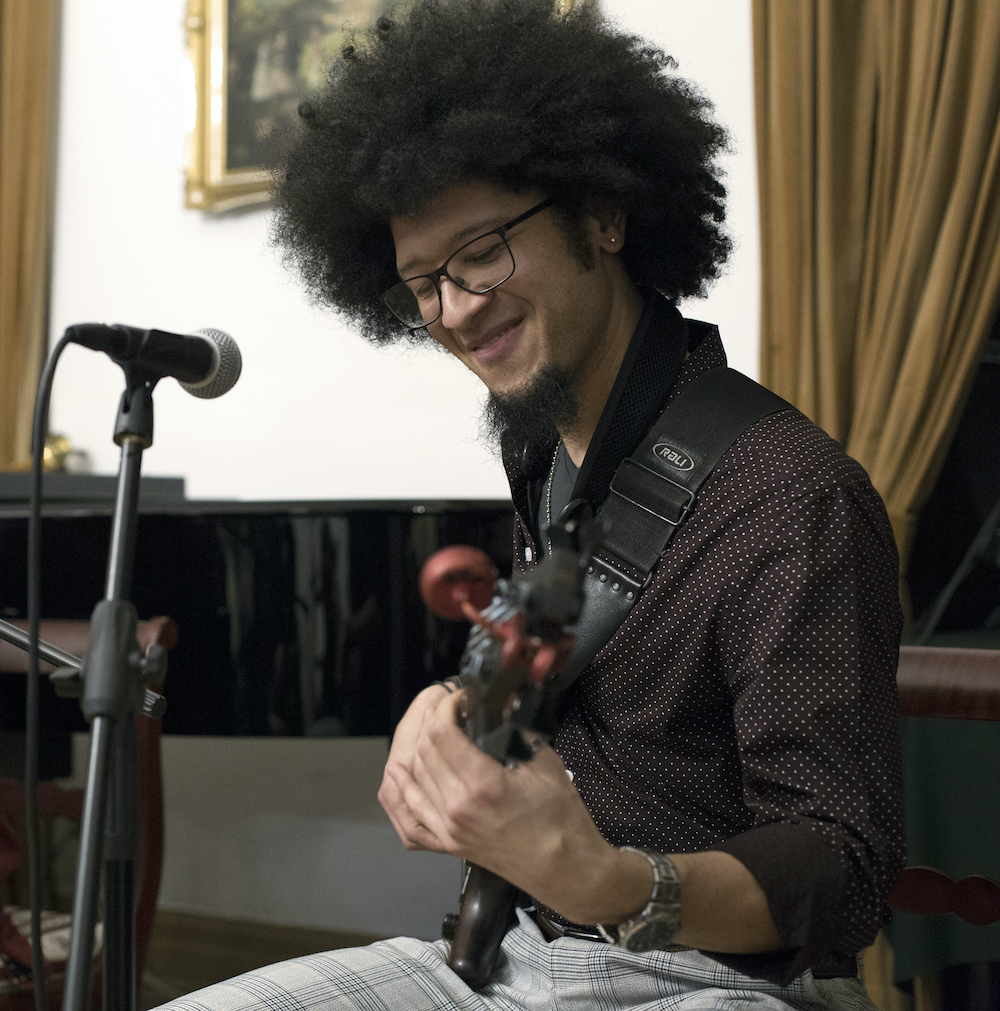
Go Change Your Mind, a number composed by Smith, sees a change of mood and direction for the set with its angsty socio-political commentary and plea not to just “look the other way”. The song sees the duo share vocal duties as they sing about recognising our collective similarities and looking away from perceived differences.
“Oh my people, don’t give it in to all the pretence
If we want a better world and time
Then it starts with us in every sense”
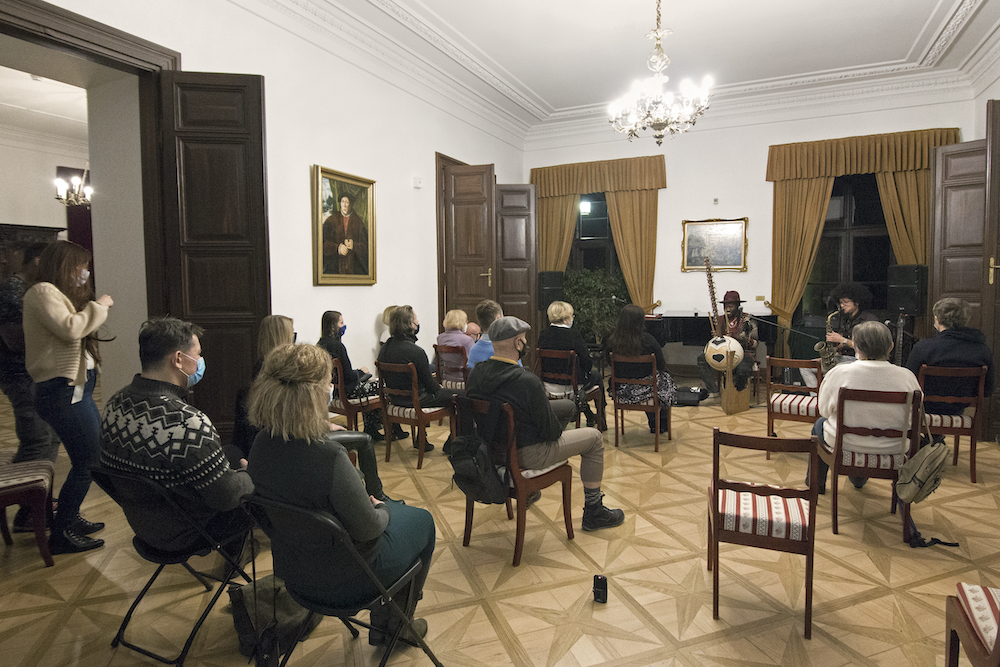
- Ethan Smith – Go Change Your Mind – live rec. 12.12.2021
5:36
The broad, boyish smile on Ablaye’s face as he plays is like a manifestation of the music flowing through his veins, eventually finding an outlet into the physical world. You cannot have one without the other: his smile is his music, the music is his smile.
Moussou Gnimma is a eulogy to all the beautiful women in our lives. It sees the kora blend with the alto sax – an atypical combination of sounds – yet it still transports me to the west of the African continent, travelling in a train across a flat expanse with an enormous sky overhead, blurs of baobab and acacia trees dotting the horizon. This time it is Ablaye’s kora that provides the spine, a slick propulsive loop of finger-picking that props up the spiky ostentatious sax bursts of Smith, its thrusts of melody punctuating the dulcet drone of the kora. It’s a great jam and I am so glad to be there.
The next song, Sunshine in English, is just so gorgeous, like falling into the deepest of naps in a beautiful foreign land, only to be awakened in a reverie as the first drops of the rainy season douse your hair. It’s straight out inspired by some of the best of kora maestro Toumani Diabaté – like 2006’s seminal work with Ali Farka Toure, In the Heart of the Moon. If you want to be influenced – be influenced by the best. Harit and Soutoukon are spilling over with joy as the call and response between the kora and sax attest to. The broad, boyish smile on Ablaye’s face as he plays is like a manifestation of the music flowing through his veins, eventually finding an outlet into the physical world. You cannot have one without the other: his smile is his music, the music is his smile. If ever there was music to delight and seduce the senses, this is it – hearing it, seeing it, feeling it – the audience lap it all up hungrily.
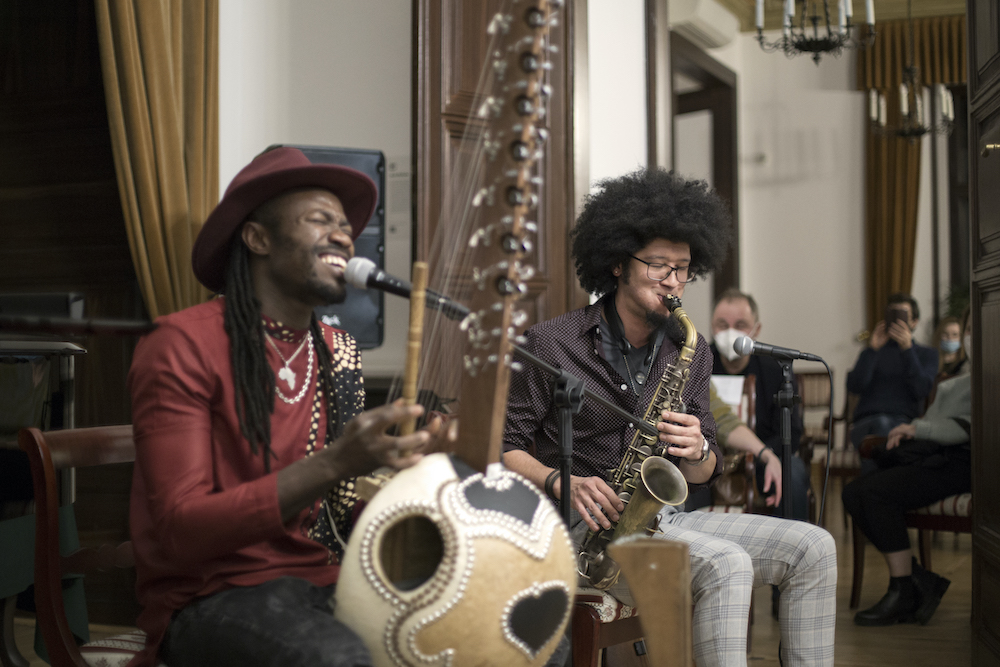
Die Stem (The Voice of South Africa), a poem written in 1919 by C. J. Langenhoven originally celebrating the beauty and majesty of South Africa, is an incongruous twist to the set that steers things off-kilter somewhat. Of course, it is curious to see how poetry can be co-opted by more nefarious political elements – the lyrics were later used as the national anthem for the apartheid regime and their infamous white minority rule. That said, I do not think that this was the setting for such a sharp left turn at the end of the set – particularly with regards to the light and playful mood of inclusiveness that had been conjured up to that point. The song did give multi-instrumentalist, Smith, a chance to flex his fingers and play a majestic grand piano which, he admitted, was a real treat. The translation in Polish and English was skilfully provided by Małgorzata Szypura.
Prayer for the Social Heroes, another sung piece composed on the piano in the darkness of a Norwegian winter when he was an exchange student, is pensive and heart-felt; its longing and melancholy draws us in and the combined layers of vocal with Ablaye work very well.
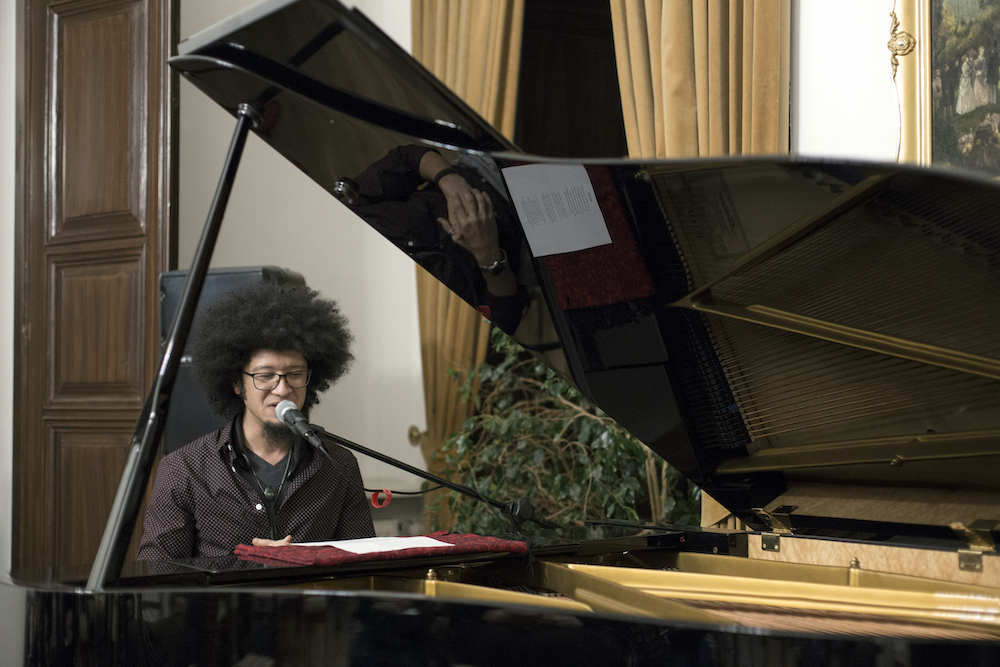
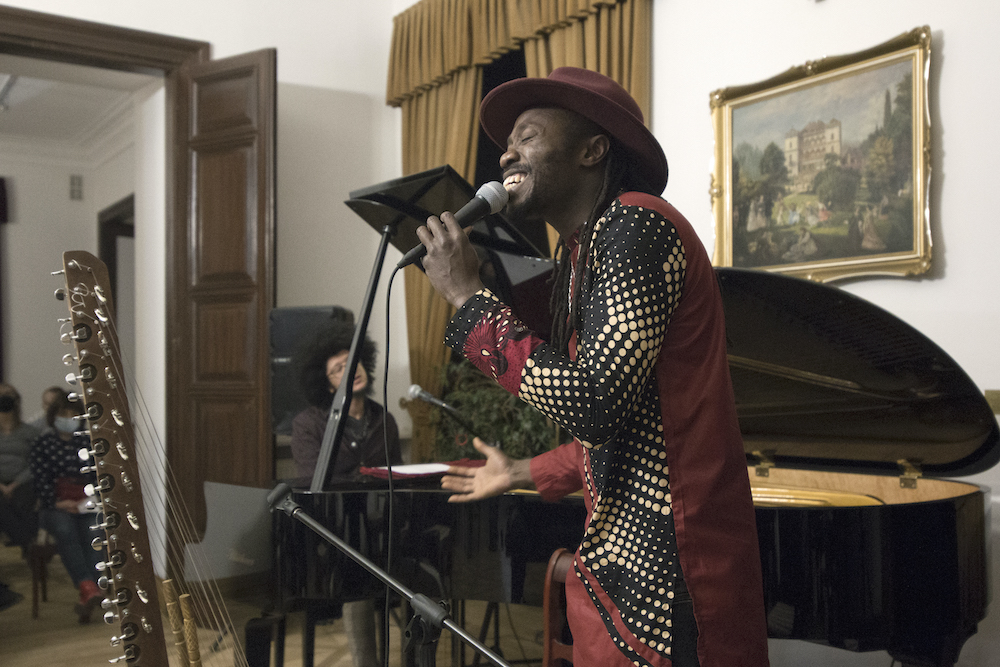
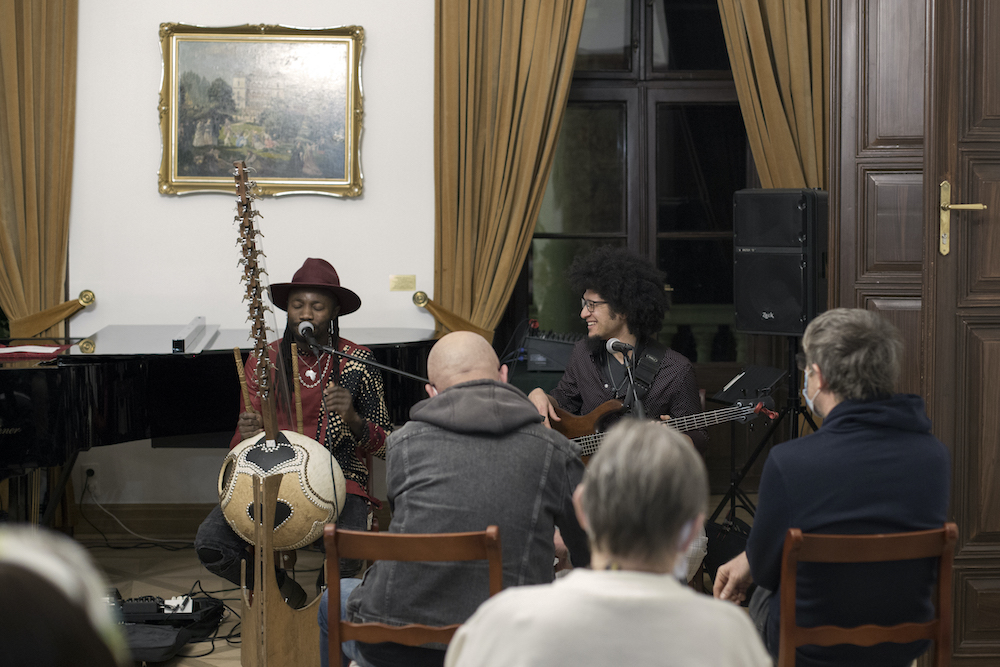
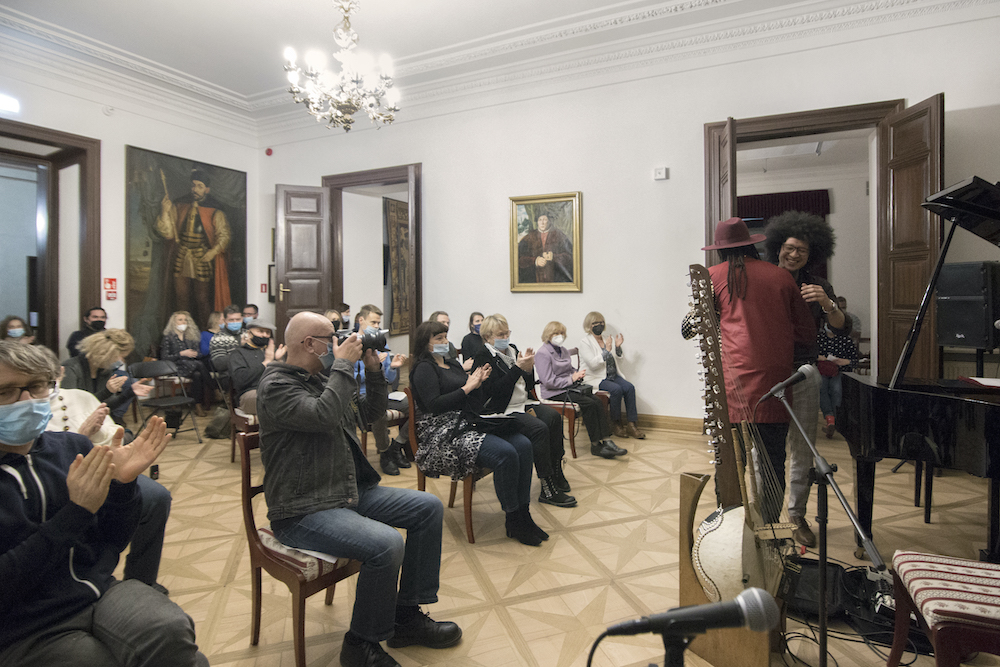
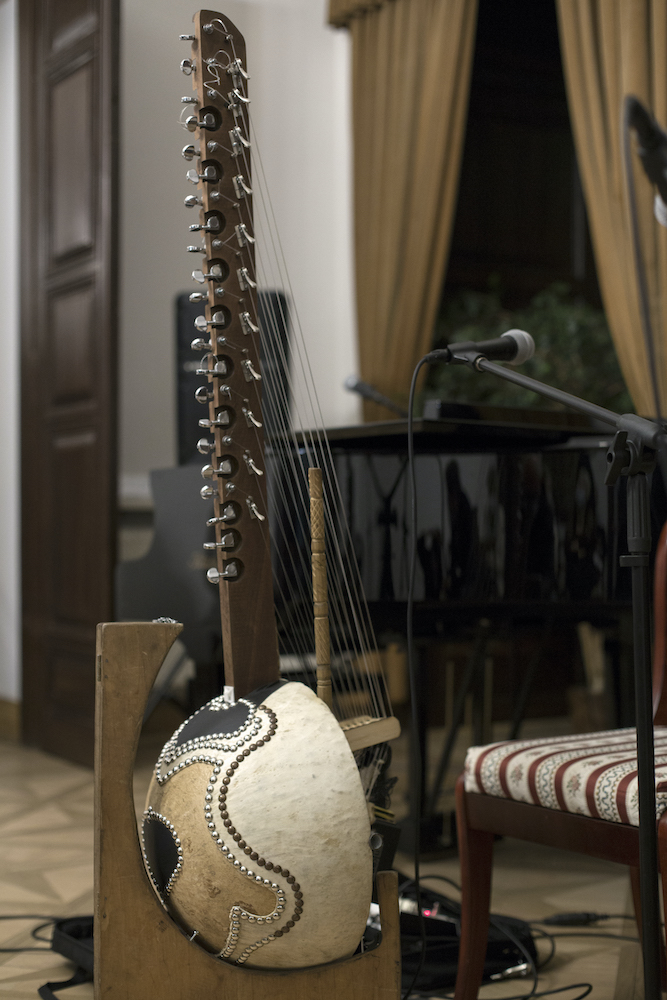
Closing number Kelefaba again sees the kora assume centre-stage and is a fitting finale that encapsulates the majority of the set’s vibe and feeling. How I would love to see these two musicians sit down and record an album of original compositions that meld kora, bass, sax etc. The prospect remains tantalising; the palette of moods they can inspire is infinite and their combined skills remarkable, as is the chemistry and intuitive musical awareness that exists between their irrepressible summertime smiles. In the meantime, try to catch them in their natural habitat – live.
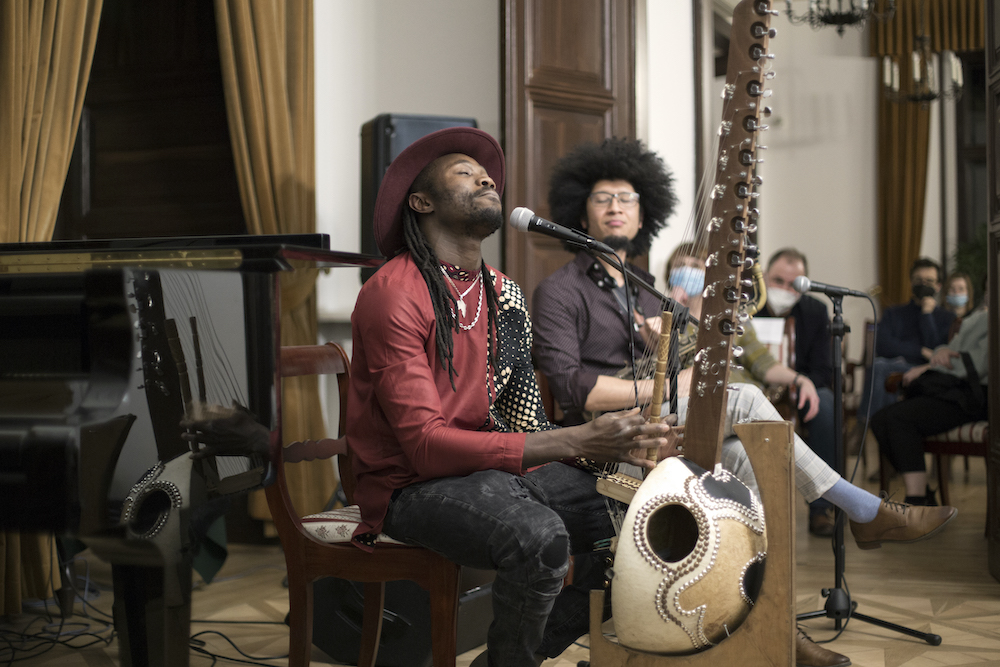
Jeśli zimową nocą na koncert, to tylko po odrobinę letniego słońca
Willa Decjusza to budynek olśniewający i wspaniały. To właśnie ten znajdujący się u podnóża prastarego Lasku Wolskiego zabytek posłużył za scenę dla kameralnego koncertu, podczas którego publiczność czarowali Senegalczyk Ablaye Badji na korze, wielostrunowej harfie z Afryki Zachodniej, oraz Ethan Smith z Południowej Afryki na basie, saksofonie altowym oraz fortepianie. Przez stulecia Willa Decjusza zaznała wielu przemian i przebudów. Budynek, który powstał w XVI wieku jako dwór wiejski, w czasie wojny zamieniono w koszary, ale służył on również jako centrum edukacyjne, szkoła z internatem, a nawet oddział dla chorych na gruźlicę. Zabytek przetrwał pomimo zniszczeń i klęsk, lat trwogi, ognia, zaniedbań i ruiny. Dziś jest on w pełni odrestaurowany – prawdziwy klejnot na kulturalnej mapie Krakowa oraz siedziba Stowarzyszenia Willa Decjusza. Dzisiejszego wieczoru willa przeobraziła się w scenę, na której dwaj muzycy, synowie afrykańskiej ziemi, rzuceni daleko od ich rodzinnych stron, mieli okazję podjąć, ucieszyć i zabawić wszystkich, którzy mieli szczęście, aby się tam znaleźć.

W poprzednich latach miałem okazję kilka razy zobaczyć senegalskiego muzyka na żywo. Wydaje mi się jednak, że ostatnio jego panowanie nad tym wzniosłym oraz magicznym instrumentem osiągnęło nowe wyżyny mistrzostwa – jego palce wędrują po strunach w sposób płynny i bezbłędny, a jest w tym wszystkim pasja i moc, powściągliwość i żywiołowość.
— Shaun O’Neill
Ablaye rozpoczyna wieczór od Keity, piosenki delikatnej jak wiosenny kwiat, ekscytującej jak pocałunek od dawna wyczekiwanego kochanka. Delikatne i łagodne brzmienia kory są równie hipnotyzujące, co przejęcie oraz radość rysujące się na twarzy artysty. W poprzednich latach miałem okazję kilka razy zobaczyć senegalskiego muzyka na żywo. Wydaje mi się jednak, że ostatnio jego panowanie nad tym wzniosłym oraz magicznym instrumentem osiągnęło nowe wyżyny mistrzostwa – jego palce wędrują po strunach w sposób płynny i bezbłędny, a jest w tym wszystkim pasja i moc, powściągliwość i żywiołowość. W grze Badjiego usłyszeć można pasję oraz dziedzictwo przodków. W Senegalu, ojczyźnie muzyka, święte linie genealogiczne griotów, afrykańskich artystów muzyki i słowa, liczą sobie setki lat, tak jak rzeki wymywające przepastne kaniony w zboczach odwiecznych gór. Jego przodkowie grali dla koronowanych głów. Zaraz zrozumiemy dlaczego. Pod palcami artysty kora, jej bogactwo brzmienia, melodyka oraz inwencja rytmiczna w niczym nie ustępują klasycznym barokowym wykonaniom klawesynowym. Bas Smitha, oszczędny w środkach i pewny siebie, służy za solidną podbudowę dla wielu utworów zaprezentowanych podczas koncertu. W drugiej piosence, zatytułowanej Kuma, basista tworzy fundament dla bogactwa środków wyrazu, które Badji wydobywa z kory w całej pełni i bez najmniejszego skrępowania. W Badi Ya, kawałku młodzieńczym i swobodnym, senegalski muzyk zachęca słuchaczy, aby ci dołączyli do artystów, poruszając się i kołysząc. Artysta kusi publikę, pokrzykując dancing is for free [tańczyć można za darmo]. Niektórzy słuchacze nie dają się zbyt długo namawiać. Publiczność w maseczkach, poruszająca biodrami oraz rozhuśtana do delikatnych dźwięków muzyki, to widok dziwaczny, ale też niezbędna zapowiedź potrzebnej nam tak bardzo normalności. Słuchacze wyklaskują rytm oraz dają się porwać muzykom, i to w przestrzeni cokolwiek przytłaczającej i trochę dla sztywniaków. To doskonale pokazuje, jak bardzo potrzebujemy radości, humoru, kontaktu z drugim człowiekiem – jak bardzo potrzebujemy muzyki.

- Keita – Ablaye Badji – live rec. 12.12.2021
5:56

Go Change Your Mind, kawałek skomponowany przez Smitha, przynosi zmianę nastroju, proponując słuchaczom pełen niepokoju komentarz społeczno-polityczny oraz nawoływanie, aby „nie odwracać wzroku”. W piosence artyści śpiewają na zmianę o odkrywaniu zbiorowych podobieństw oraz zakopywaniu dzielących nas różnic.
Oh my people, don’t give it in to all the pretence
If we want a better world and time
Then it starts with us in every sense
[Człowieku, nie daj się zwieść pozorom / Chcesz żeby było lepiej na tym świecie / To zacznij najpierw od siebie]

- Ethan Smith – Go Change Your Mind – live rec. 12.12.2021
5:36
Szeroki, chłopięcy uśmiech na twarzy grającego na korze Badjiego to najlepszy dowód na to, że muzyka płynie w jego żyłach, znajdując zarazem wyraz w świecie fizycznym. Jedno nie może istnieć bez drugiego: uśmiech wybrzmiewa muzyką, muzyka rysuje uśmiech na twarzy.
Moussou Gnimma to pean na cześć wszystkich pięknych kobiet w naszym życiu. Dźwięki kory mieszają się tu z dźwiękami saksofonu altowego, co jest nietypowym połączeniem, które jednak przenosi mnie do Afryki Zachodniej, zabierając w podróż koleją przez rozległą równinę pod bezkresnym nieboskłonem. Na horyzoncie majaczą rozmazane sylwetki akacji i baobabów. Tym razem to kora nadaje strukturę muzyce. Artysta biegle wygrywa pełen energii powtarzalny rytm służący za tło dla szarpanych i ostentacyjnych wybuchów saksofonu, którego agresywna melodyka przecina szczebiotliwe dźwięki kory. Świetna improwizacja. Cieszę się, że mogę tu być.
Kolejna piosenka, o angielskim tytule Sunshine, jest po prostu cudowna, jak najgłębsza drzemka w pięknym obcym kraju, którą przerywają pierwsze krople pory deszczowej spadające na włosy. Widać tu wyraźną inspirację jednym z największych wirtuozów kory Toumanim Diabatém. Na myśl przychodzi tu choćby jego kultowy album nagrany w 2006 r. z Alim Farką Tourem, In the Heart of the Moon. Jeśli ulegać wpływom, niech będzie to wpływ najlepszych. Harit oraz Soutoukon przepełnia radość, którą rozbrzmiewa dialog między korą a saksofonem. Szeroki, chłopięcy uśmiech na twarzy grającego na korze Badjiego to najlepszy dowód na to, że muzyka płynie w jego żyłach, znajdując zarazem wyraz w świecie fizycznym. Jedno nie może istnieć bez drugiego: uśmiech wybrzmiewa muzyką, muzyka rysuje uśmiech na twarzy. Jeśli istnieje muzyka, która uwodzi zmysły i daje im rozkosz, to właśnie jest ta muzyka, a publiczność z entuzjazmem wsłuchuje się w muzykę, wpatruje w artystów, odczuwa te same wibracje.

Die Stem van Suid-Afrika (The Voice of South Africa), wiersz napisany w 1919 r. przez C. J. Langenhovena, powstały jako pean na cześć piękna i wspaniałości Południowej Afryki, gryzie się z resztą wybranego na wieczór repertuaru. Tekst ten to rzecz jasna ciekawostka oraz przykład na to, jak można zaprząc poezję do realizacji niegodziwych celów politycznych – wiersz ten śpiewano jako hymn narodowy w czasach apartheidu oraz niechlubnych rządów białej mniejszości. Nie jestem jednak pewien, czy ten utwór był najlepszym akcentem na zakończenie wieczoru, zwłaszcza że poprzedzające go utwory, radosne i pełne lekkości, mówiły o świecie otwartym i pozbawionym uprzedzeń. Piosenka stanowiła okazję dla Smitha, aby ten wykazał się jako multiinstrumentalista i popisał zręcznością palców przy fortepianie. Jak sam przyznał, zasiąść przy tym wspaniałym instrumencie to była prawdziwa gratka. Tekst utworu na język polski i angielski świetnie przetłumaczyła Małgorzata Szypura.
Kolejną piosenkę na fortepian, Prayer for the Social Heroes, Smith skomponował w mrokach norweskiej zimy, którą spędził tam w ramach wymiany studenckiej. Słuchaczy wciąga zaduma i autentyczność, tęsknota i melancholia, a nakładające się na siebie partie wokalne Smitha i Badjiego doskonale się uzupełniają.





Kora znalazła się ponownie w centrum uwagi w Kelefabie, numerze zamykającym wieczór, świetnym podsumowaniu całego koncertu i panujących w jego trakcie nastroju i wibracji. Chciałbym zobaczyć, jak ci dwaj muzycy nagrywają album wypełniony oryginalnymi kompozycjami, w którym mieszają się dźwięki kory, basu, saksofonu. To kuszący scenariusz – paleta nastrojów ewokowanych przez artystów wydaje się nie mieć końca, a mieszanka ich umiejętności niespotykana, tak jak chemia oraz intuicyjna muzyczna świadomość, którą widać w letnich uśmiechach, nie chcących zniknąć z twarzy artystów. Zanim to jednak nastąpi, warto zobaczyć muzyków w ich naturalnym środowisku – podczas występów na żywo.

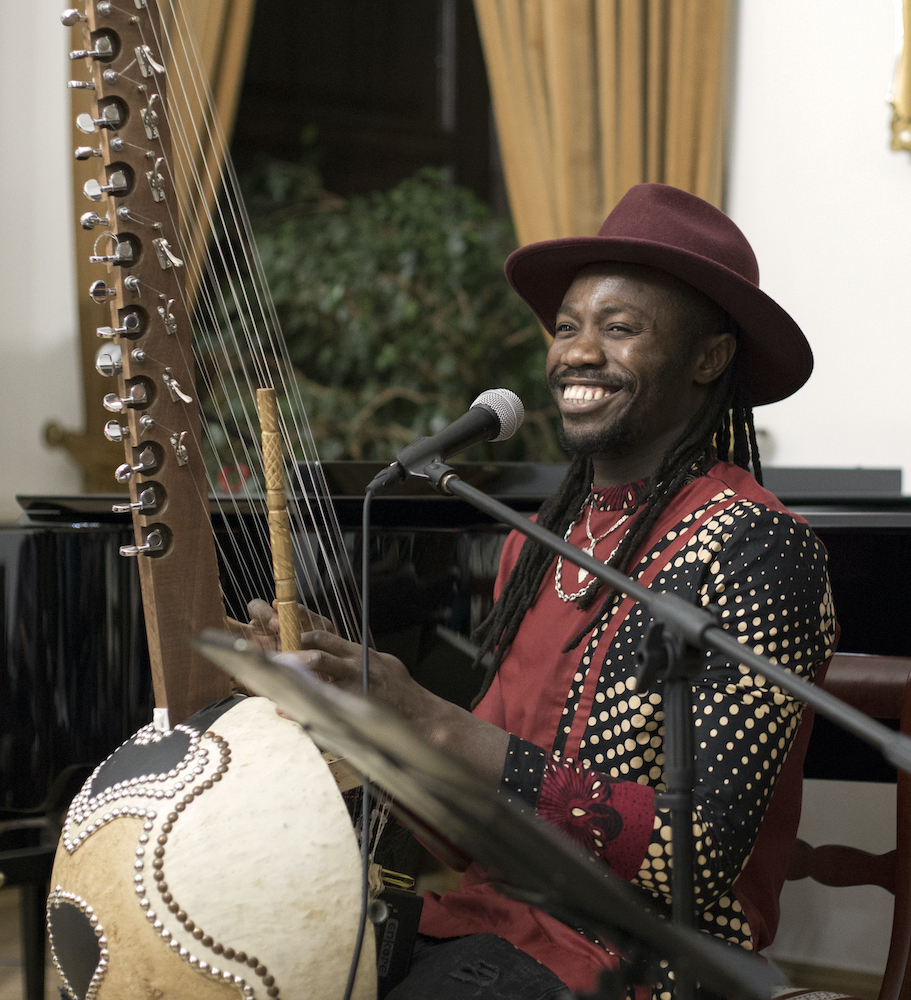
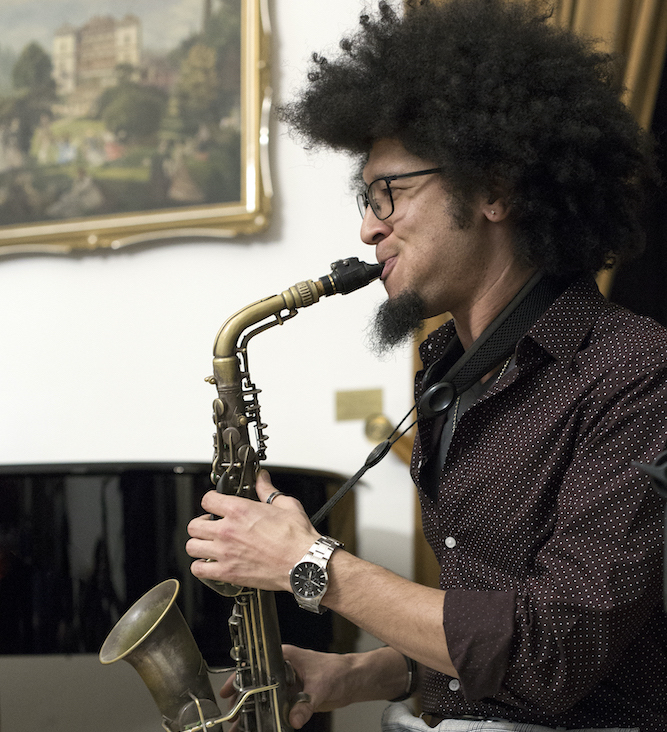
Comments
[…] Transcending the Enlightenment – One Oneiric Performance at a Time African Duo Enchant and Enthral All at Villa Decius: A dark midwinter’s evening is the setting for… […]
[…] READ & LISTEN: Ablaye Badji & Ethan Smith […]